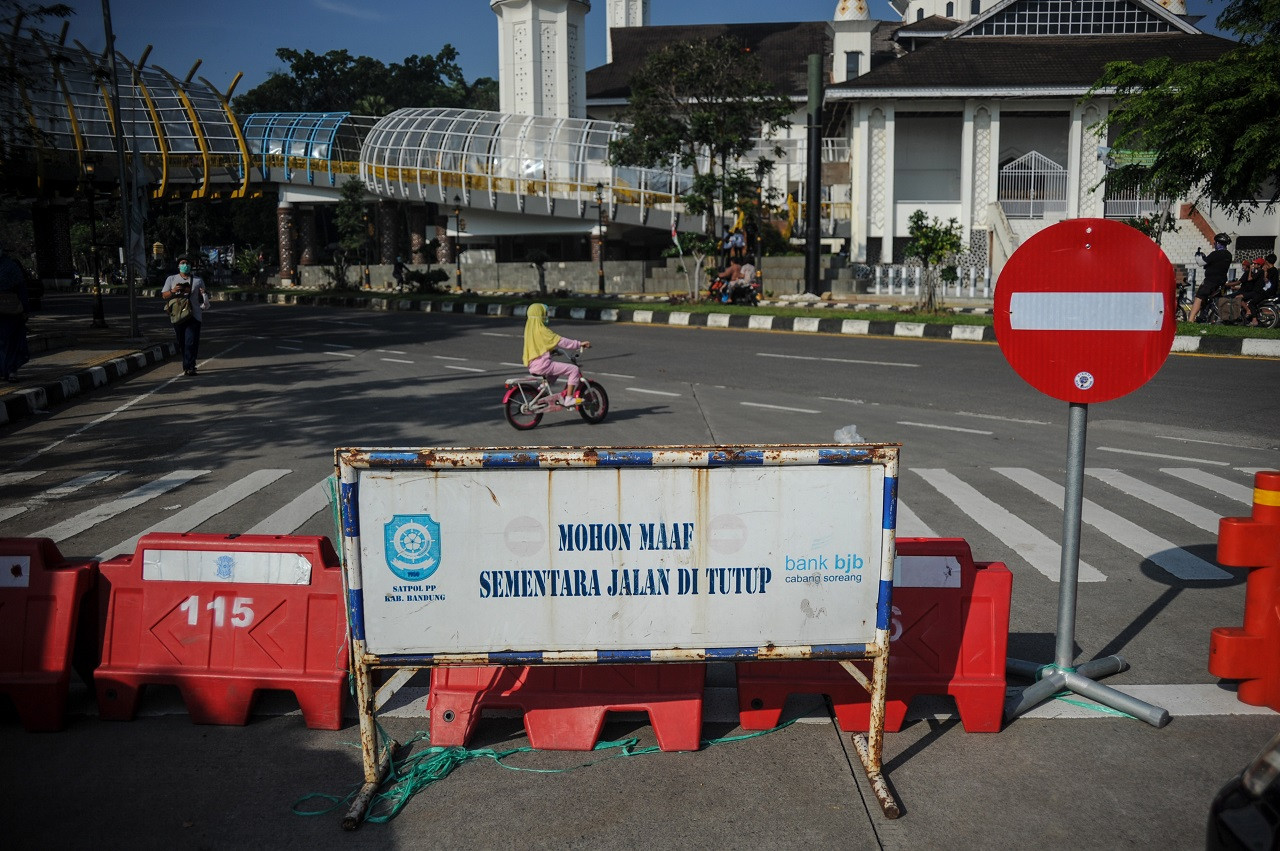Popular Reads
Top Results
Can't find what you're looking for?
View all search resultsPopular Reads
Top Results
Can't find what you're looking for?
View all search resultsGovernment excludes death tally from PPKM assessment
All indicators important in pandemic decision-making: Experts
Change text size
Gift Premium Articles
to Anyone
T
he government says it has excluded the daily death toll from the group of indicators it uses to establish the severity levels of its multi-tiered public activity restrictions (PKPM), claiming that the COVID-19 death figures have “distorted” its assessments.
The change was announced on Monday in conjunction with the extension of PPKM until Aug. 16 on Java and Bali and until Aug. 23 in the rest of the country.
Coordinating Maritime Affairs and Investment Minister Luhut Binsar Pandjaitan, who is leading the government’s COVID-19 response efforts on Java and Bali, said the government had altered its assessment criteria after finding that the situation on the ground had improved in some areas and opting to relax curbs there.
“There are 26 cities and regencies whose PPKM levels have dropped from level 4 to level 3, indicating that the situation [in these areas] has improved significantly,” Luhut said at a press conference on Monday.
“We evaluated [the situation] after excluding the fatality indicator from our assessment because we found that the accumulation of the fatality tally over the past few weeks had distorted [our] assessment.”
Coordinating Maritime Affairs and Investment Ministry spokesman Jodi Mahardi said delays in reporting COVID-19 deaths were responsible for the distortion and had created assessment difficulties, as quoted by kompas.com. He added that the government would begin considering the indicator again after it had redressed the data discrepancies.
Luhut said the government would establish a special team charged with bringing down the fatality rate in regions that had experienced surges of deaths over the past few weeks, such as Yogyakarta.
Read also: Indonesia extends COVID-19 curbs as infections spread in regions
Prior to the change in the use of indicators, level 4 restrictions – the highest of the four-tiered system – were enforced in regencies or cities that had more than five deaths per 100,000 people per week, more than 150 confirmed cases per 100,000 people per week and more than 30 patients hospitalized per 100,000 people per week.
Epidemiologists criticize tweak
Epidemiologists have said in response to the change in policy that the daily fatality rate is among the most important indicators of the true scale of the COVID-19 pandemic in the country, given the unreliable and inconsistent nationwide testing and tracing efforts.
Masdalina Pane of the Indonesian Epidemiology Association (PAEI) said fatality numbers were an important indicator of the government’s control over the pandemic, adding that ignoring the indicator could have international repercussions.
“We can pretend to ignore the high fatality figure, but other countries will surely take note of the Indonesian government’s commitment to [pandemic handling],” said Masdalina.
She emphasized that “all indicators” were important in assessing the scale of the pandemic in the country, adding that the government should focus on improving its performance in some indicators, such as testing and tracing, to meet its own targets.
Pandu Riono, an epidemiologist from the University of Indonesia, echoed Masdalina’s view and questioned the reasoning behind the government’s move.
While case numbers have fluctuated since the country enacted the most recent round of mobility curbs in early July, daily fatality figures have remained persistently high. On Tuesday, national COVID-19 task force data showed that 2,048 people had lost their lives to the disease over the preceding 24 hours.
The figure was the nation’s second-highest daily death toll, slightly lower than the 2,069 deaths recorded on July 27. More than 110,000 people in the country have died of COVID-19 so far.
According to task force data, more than 32,000 new COVID-19 cases were recorded on Tuesday, bringing the country’s cumulative case tally to more than 3.7 million. The figure was lower than the record high of 56,757 new cases on July 15, but remained well above the government’s target – set in early July – of bringing new cases below 10,000 per day.
Some restrictions relaxed
While the government has again extended multi-tiered PPKM, it has eased certain attendant restrictions.
In selected cities under level 4 PPKM on Java, the government will allow malls to operate at 25 percent of visitor capacity. Only those who have been vaccinated and are aged between 12 and 70 will be allowed to enter the malls.
Such cities include Jakarta; Bandung, West Java; Surabaya, East Java; and Semarang, Central Java.
Houses of worship located in level 4 areas may hold services at no more than 25 percent of capacity under most circumstances.
Certain export-oriented factories in level 4 areas of Java and Bali are allowed to operate at full capacity, with workers divided into two shifts.
Level 3 PPKM are generally less stringent. For example, schools may hold in-person classes at 50 percent of student capacity.
Coordinating Economic Affairs Minister Airlangga Hartarto, who is leading the implementation of PPKM outside Java and Bali, said the government would continue to monitor conditions, particularly in cities and regencies outside Java and Bali. He noted that COVID-19 cases had drastically increased in North Sumatra, East Kalimantan, West Sumatra and Riau.
Read also: Jokowi orders 'quick response' as COVID-19 spread shifts to regions
The government, Airlangga added, would expand the capacity of isolation centers outside Java and Bali in anticipation of a case surge. He said some vessels from state-owned ferry operator PT Pelayaran Nasional Indonesia (Pelni) would be converted into isolation centers and deployed to Medan, North Sumatra; Bandar Lampung, Lampung; Sorong, West Papua; and Bitung, North Sulawesi.










